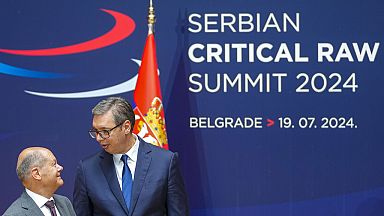

German Chancellor Olaf Scholz, left, and Serbian President Aleksandar Vucic leave after a press conference at the Serbia Palace in Belgrade, Serbia, Friday, July 19, 2024. - Copyright Darko Vojinovic/Copyright 2024 The AP. All rights reserved
Copyright Darko Vojinovic/Copyright 2024 The AP. All rights reserved By Bojan Brkic Published on 25/07/2024 - 18:18 GMT+2Share this article
Share this articleSerbia's "lithium deal" is coming back as part of an initiative that officials in Brussels, Belgrade and Berlin hope will be a huge green boon for the continent.
ADVERTISEMENTA rather sudden and under-the-radar meeting took place in Serbia's capital last week.
A delegation of high-ranking European officials and business leaders made their way to Belgrade for the inconspicuously named "Summit on Strategic Raw Materials", organised by the Serbian government, which produced a single memorandum of understanding.
But this event had some A-list guests: Serbia rolled out the red carpet for German Chancellor Olaf Scholz, European Commission Vice-President for the European Green Deal Maroš Šefčovič, and the chief executives of major European banks such as the European Bank for Reconstruction and Development, KFW and the Italian Development Bank.
The chief executive of German car giant Mercedes-Benz was also in attendance.
But what were these big guns of European politics and business doing in Belgrade?
It turns out that the memorandum that Šefčovič signed with the Serbian Minister for Energy and Mining Dubravka Đedović Handanović may end up being one of the most important developments for Europe's green industry and, quite certainly, for Serbia's economy as it marches on in its attempts to join the EU.
In Serbia, the memorandum is known colloquially as "the lithium deal".
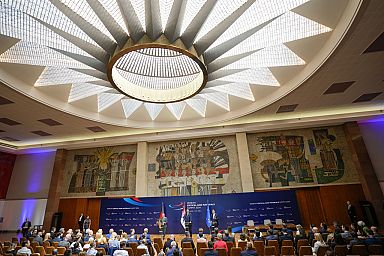
Global mining giant Rio Tinto has explored the Serbian mountains for more than 20 years in pursuit of iron and other metals. Eventually, in 2004, it found more than they bargained for: a huge deposit of lithium.
With an estimated 158 million tonnes of ore containing 1.8% lithium-oxide in the newly discovered mineral, jadarite (named after the Jadar region of Serbia it was found in), this deposit, if excavated from deep underneath the mountain, could see enough batteries made to power 30% of Europe's election car production.
The Serbian government said it aims to meet at least 20% of Europe’s lithium demand.
For Europe's green transformation, the prospect of a huge lithium supply in the heart of the continent would be a huge relief.
Most of the lithium Europe uses currently comes from Asia and South America. The COVID-19 pandemic, Russia's full-scale invasion of Ukraine and other disruptions to global supply chains have made it clear that dependency on long-distance supplies is fraught with uncertainty.
Faced with these challenges, Europe scrambled to find strategic resources closer to home, and while there are other mining prospects in countries like Germany, Finland, Spain, Portugal and the UK, the one in Serbia, having started two decades ago, is way ahead of the pack: Rio Tinto has allocated $450 million (€415m) to it so far.
But, as often happens with mining projects, there have been setbacks. There was a huge public uproar when Rio Tinto purchased the land and got the green light to start building the mine.
Politicians, environmentalists, and activists alike sounded the alarm about the mine's possible pollution, arguing that the unfamiliar processes used in the project could poison the waterways and soil of the beautiful and fertile, albeit scarcely populated, region.
ADVERTISEMENTMassive demonstrations and road blockades that ensued caught Rio Tinto, which was ill-prepared, and the government, which was facing an already scheduled early election, off guard.
So, in January 2022, the licences were revoked, and the government declared the project effectively dead.
But the memorandum of understanding signed in Belgrade last week has given it a new breath of life.
Both the host, Serbian President Aleksandar Vučić, whose government secured a new four-year mandate in recent elections, and his European guests spared no praise in emphasising the economic potential of the project.
ADVERTISEMENTVučić said there is still a long way to go before the mine will be opened, but that the process will be transparent with "no secrets".
"This is crème de la crème of the European industry and it is clear that we have brought Europe to Serbia," he said after the signing ceremony.
"This day fills me with hope for our country," he continued. "It is important for Europe, for Germany but, above all, for Serbia. It will mark a turning point, a great change, a quantum leap into the future."
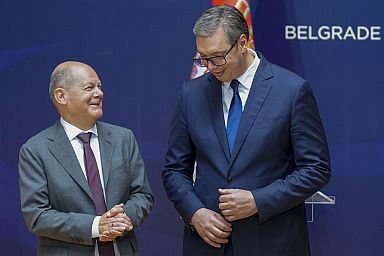
The vast amount of players bidding for the opportunity to quench Europe's thirst for lithium was demonstrated during the last leg of Chinese President Xi Jinping's recent European tour.
ADVERTISEMENTDuring his visit to Hungary, the Guangdong-based Eve Energy company announced it was buying land in the Hungarian city of Debrecen to construct a battery factory.
The Chinese company supplies batteries to car manufacturers such as Daimler, Jaguar Land Rover, and BMW, which is building a plant in Debrecen that is solely for electric cars.
Being a hub for European green transformation may bring the country closer to its goal of becoming an EU member.
Scholz implied as much when he hailed the initiative as a good way to help Serbia assimilate with Europe.
ADVERTISEMENT"I have to add that this is indeed a European project," he said at the summit. "We need European spirit and that is something very important for the future. I would connect my presence here with the clear support for the European integration of the Western Balkan countries."
The mine itself, when opened presumably by 2028, will employ 2,100 workers directly. But would the creation of jobs be worth the pollution risk?
The summit's participants did their best to address the fears of the Serbian public, including concerns that Serbia would risk its environment for the sake of poorly paid mining jobs and some petty cash from the mining fee — at just 5% for the metals.
A post that went viral on social media in Serbia shows a photo of an extremely skinny child in rags kneeling in the mud, allegedly in a diamond mine somewhere in Africa. Its caption says: "The kind of prosperity that mining for the Europeans brings."
ADVERTISEMENTMeanwhile, Austrian Der Standard newspaper published an opinion article claiming that a new Western colony was born in the Balkans and blasting Scholz for striking a deal with Vučić.
The EU itself has criticised Vučić and his government in recent times over concerns about the rule of law in the EU candidate country and reports that the most recent general elections in the country were marred by irregularities.
To reassure the public, Vučić has promised to ban the export of lithium from Serbia, meaning that all those who want to use Serbian lithium will have to open factories in the Balkan country. European guests at the summit appeared to have no objection, with the phrase “value chain” becoming the leitmotif of the event.
"This project creates a new potential value chain, and secures the possibility to create new jobs, not only in mining but in the other steps of processing," Scholz said. "It connects Serbia to the future of mobility which must be carbon-free. So, we are talking about the turning point for the mobility of the future."
ADVERTISEMENTVučić echoed similar views, noting that the project will bring "at least €6 billion of new investment to Serbia".
"Mr Sholtz said he would do his best to form a value chain here in Serbia so that we have factories here instead of shipping raw materials abroad," he said. "We shall fight for the producer of the final product — electric car. We already have Stellantis but we'll bring others as well."
RelatedThe UK ambassador to Serbia, Edward Ferguson, speaking to Euronews Serbia after the summit, said he was convinced that the deal would be fair and would turn Serbia into a green tech hub.
“We help Serbia to get more than just lithium," Ferguson said. "More precisely, we are considering how to build the value chain so that, after the lithium that will come out of the land, we have the processing of lithium: turning lithium into cathodes that will then go into the batteries which will eventually power the new generation of electric cars."
ADVERTISEMENTAnother event in Serbia, just a couple of days after the summit in Belgrade, gave a glimpse of the value chain's potential.
In Kragujevac, also known as "Serbian Detroit" for its ever-present car industry, automobile giant Stellantis opened a new production line and launched the first electric car made in Serbia, a new Fiat Grande Panda. The line will employ 2,000 workers.
Speaking at the event, Stellantis' executive director Carlos Tavares said that the company would look into the new lithium deal between Serbia and the EU.
"The biggest weakness of electric cars is their affordability," he said. "So, I think this is a good move, and we are, of course, part of the story. We shall seek to have a good proposal for the procurement from this (memorandum) initiative."
ADVERTISEMENT"I think it makes perfect sense," Tavares added.
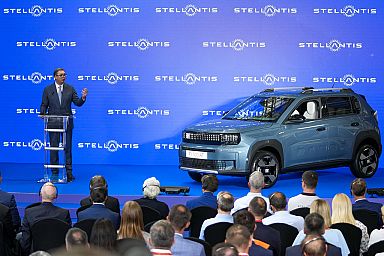
However, the shadow of the major worry that drove the people of Serbia out onto the streets two years ago still looms large: can mining for lithium be done without disastrous environmental consequences?
During the summit in Belgrade, all eyes were on any guarantees that Europe could give Serbia to ensure ecologically responsible mining. And the participants knew it.
Šefčovič told the event that the EU's "clear intention" is to respect the "highest environmental standards".
ADVERTISEMENT"We have the most comprehensive regulatory framework," he said. "Each battery will have a passport — a QR code which provides access to information, what is the carbon print, recycling guarantee, whether the people in the value chain were treated fairly. This will be the seal of the highest standards."
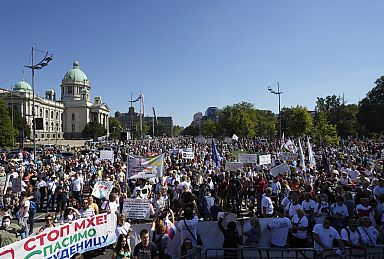
Scholz added that the EU's involvement should go beyond providing a regulatory framework.
"We are not here to merely incentivise, but to be present as partners in applying environmentally acceptable solutions using the expertise of our mining engineers," he explained.
"We are going to do it, share the expertise our experts accumulated over the centuries that is among the best in the world. We will do it in order to make sure that our joint project succeeds."
ADVERTISEMENTThe chancellor added that he told Rio Tinto executives that the project would be allowed to proceed only if it adhered to the highest standards and that he had assurances to that effect.
While environmentalists and local organisations in Jadar remain unconvinced and maintain that water and food are, in fact, Serbia’s strategic resources for the future, the Serbian government has issued dozens of exploration licenses to mining companies, so the project appears to be progressing at a pace.